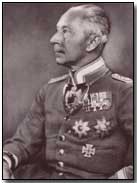Primary Documents - Crown Prince Wilhelm on the German Revolution, 16 November 1918
 With Germany actively
seeking an armistice and revolution threatening, calls for
Kaiser
Wilhelm II to abdicate grew in intensity. Wilhelm was
himself deeply reluctant to make such a sacrifice, instead expressing a
preference to lead his armies back into Germany from the Western Front.
Upon being informed by his military advisers that the army could not be
relied upon not to harm him
Wilhelm abandoned the notion.
With Germany actively
seeking an armistice and revolution threatening, calls for
Kaiser
Wilhelm II to abdicate grew in intensity. Wilhelm was
himself deeply reluctant to make such a sacrifice, instead expressing a
preference to lead his armies back into Germany from the Western Front.
Upon being informed by his military advisers that the army could not be
relied upon not to harm him
Wilhelm abandoned the notion.
Wilhelm's abdication was announced by Chancellor Prince Max von Baden in a 9 November 1918 proclamation - before Wilhelm had in fact consented to abdicate (but after Social Democrat Philipp Scheidemann had announced the Kaiser's departure from the balcony of the Reichstag). Faced with a fait accompli Wilhelm formally abdicated and went into exile in Holland. His abdication proclamation was formally published in Berlin on 30 November 1918.
Faced with public criticism over the nature of Wilhelm's abdication German Army Chief of Staff Paul von Hindenburg issued a statement on 20 March 1919 explaining the sequence of events and defending the Kaiser's role.
In the wake of the Kaiser's abdication his eldest son - Crown Prince Wilhelm - expressed a desire on 11 November 1918 - the date of the armistice - to be allowed to lead his army back home to Germany. His wish was, given the anti-royalist fervour of the moment, rejected out of hand by the government. He too went into exile in Holland, despatching a letter to Hindenburg following his arrival in which he explained and justified his position (reproduced below).
Having instigated the Kaiser's abdication Prince Max resigned, handing power to incoming Chancellor Friedrich Ebert who, in statements issued on 10 November and 17 November, appealed for public calm and reassured the German public that the incoming government would be "a government of the people".
Crown Prince Wilhelm to Paul von Hindenburg on the German Revolution, 16 November 1918
Highly Honoured Field Marshal:
In these most grievous days of our life, both for my father and for myself, I too must say goodbye to your Excellency.
With deep emotion I have been obliged to decide to make use of the authority granted me by your Excellency to lay down my post as chief commander and to take up my residence in the first instance in a neutral country.
I have only been able to force myself to this step after hard internal struggles, although it is repugnant to my whole nature not to be able to lead my brave troops home.
I desire, however, once again briefly to explain my attitude.
Contrary to many unjust opinions, which have always tried to represent me as a war instigator and a reactionary, I have from the beginning adopted the standpoint that this war was for us a war of defence.
Again and again during 1916, 1917, and 1918 I made both oral and written representations to the persons concerned that Germany must endeavour by every means in her power to terminate the war and be glad at maintaining herself against the entire world on the basis of the status quo.
In many conversations with General Ludendorff I for a long time pleaded for a wise peace by understanding, and expressed the view that the most favourable opportunity for attaining this end was reached when we occupied strong, powerful positions before and also during the spring offensive.
As regards internal politics, I am the last person to oppose the liberal development of our Constitution. Only a few days ago I set forth this view in writing to Prince Max of Baden.
Nevertheless, when the weight of events hurled my father from his throne, I was not only not heard, but was simply passed over as Crown Prince and as heir to the throne. No renunciation was either demanded from or made by me.
Notwithstanding these facts my standpoint was to persevere at my post, and my ideal was, by holding my army group together, to avoid further causes of damage and disintegration for our Fatherland.
The attitude of the present Government, however, was authoritative as to my remaining further at my military post. I had been informed by it that the Government did not count upon further military employment for me.
Your Excellency will kindly also note that copies of this letter have been sent to the Minister of the royal house, the Prussian Ministry, the Vice-Presidents of the lower house, the President of the upper house, the Chairman of the Military Cabinet, and some friends of mine among the military leaders.
FREDERICK WILHELM
Source: Source Records of the Great War, Vol. VI, ed. Charles F. Horne, National Alumni 1923
'Strafing' is attacking ground troops by machine guns fired from low-flying aircraft.
- Did you know?
